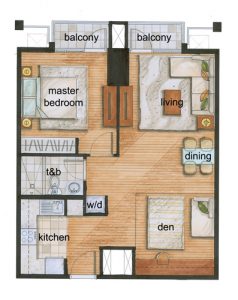Parents Purchasing for/with Children
Rent contributions to help an adult child quickly add up, leading many parents to wonder if it may make more sense to purchase an apartment. In NYC, where the real estate market has maintained its investment appeal over time, for parents who are willing and can afford it, purchasing often does make sense.
At what point does it make sense to buy?
This depends on how long you plan to own the home. During that time period, the cost of owning a home versus the cost of renting a similar home is the metric most commonly used to understand when it makes sense to own rather than rent. Generally, in NYC, if you plan to own the property for at least 5 years, then it may make financial sense to buy.
The cost of ownership includes closing costs on both the buying and selling ends; property taxes and common charges (or maintenance fees in a co-op), mortgage principal and interest, homeowner’s insurance, and renovation expenses. The cost of renting includes monthly rent, fees, and rental insurance.
The bonus of ownership is the potential appreciation of the value of the property over time – the longer the period of ownership, the more the value of the property is expected to increase. Additionally, there is a tax deduction for mortgage interest and real estate taxes that does not exist for rentals. Often, the monthly outlay is similar after the parents have contributed to, or provided, the down payment.
Condo vs. Co-op
The purchase of a co-op is less costly than a condo, but comes with restrictive rules on how it can be both purchased and used. Although every co-op has it’s own rules, most do not allow purchase by a trust or LLC, and some do not allow co-purchase or a guarantor. Sponsor co-op apartments are the exception. Since there is no board approval process, these can be purchased in any form, but once purchased, all co-op rules must be followed. Condos, while more expensive, can be purchased under any scenario and there are less restrictions regarding the use of the property.
How to structure the purchase
Many parents purchase a property themselves, allow their children to live there for a few years under agreed-upon terms, and then keep it as a pied-a-terre. Others help their children purchase the property in their children’s name, or purchase jointly.
Co-Purchasing
When parents and the child purchase the property together, they will each need to fill out a purchase application and attend a Board interview for a co-op. Co-ops generally prefer this scenario over purchasing in the parents’ name for the child’s use, given that the child will be the one living there.
Guarantor
In this scenario, the child is the sole purchaser, but the parents guarantee the payment of the maintenance or common charges, and most likely the mortgage as well. If the child fails to stay current with payments, the building and the bank can go to the parent guarantor for payment. In most cases, the parent will also need to complete an application.
Gifting
The parent has the choice to retain ownership as an investment or a future pied-a-terre, gift the property to the child, or own it jointly through a family trust. If the child will be the owner by way of a gift, the parent submits an Affidavit of Gift, but typically is not required to submit an application. A percentage of the down payment or purchase price can also be gifted this way. In most cases, after the down payment, the child’s debt to-income-ratio and post closing liquidity must still meet the financial qualifications of the building.
At Spark Realty, we work closely with parents who want to help their adult children purchase a home in the city. As always, we are happy to answer any questions that may be unique to your situation. To explore these options in more detail, please contact us at [email protected]




